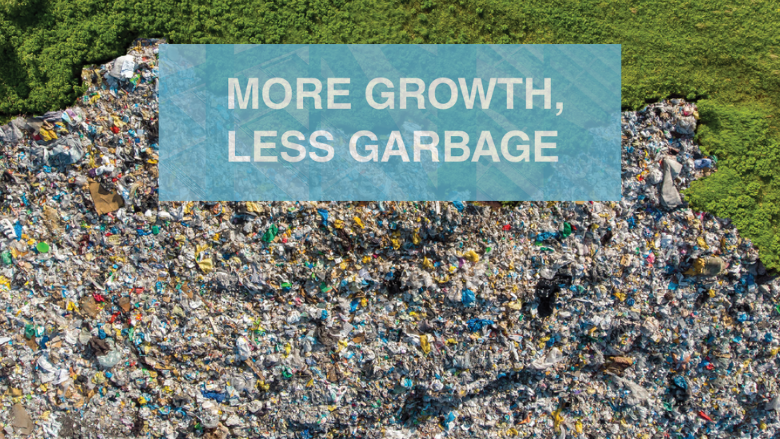Cities and countries are struggling with unchecked waste generation, especially during the COVID-19 crisis, giving rise to one critical question – as they eye a recovery from the pandemic, how can governments decouple waste generation from economic growth and empower themselves to tackle trash in a sustainable manner?
A new report, More Growth, Less Garbage, paints an updated picture of what waste generation could look like if the world continued down a business-as-usual path and how countries can choose to take action to adopt sustainable practices and generate less garbage. It shows that while there has been a direct connection between waste generation and income per capita historically, recent examples show that it is possible to separate the amount of waste generated from economic growth. If countries adopt comprehensive waste reduction policies, it is possible for the world to produce less trash than originally feared by 2050.
The report is also intended to give policymakers concrete ideas to institute sustainable waste management in local economies. One way of breaking the link between greater prosperity and excess trash is using policies to encourage recycling, repurposing and raise awareness around the hazards of generating too much waste.
Currently, the trajectory for global waste generation shows that it will grow from 2.24 billion tonnes in 2020 to nearly 3.88 billion tonnes by 2050. Moreover, more than 90 percent of trash in low-income countries is either dumped in the open or burned, posing a threat to the environment, exacerbating climate worries and making it imperative for countries to tackle the issue immediately.
The report presents five case studies -- from Cambridge in the United States, Yokohama in Japan, Tacloban in the Philippines, Ljubljana in Slovenia and The Republic of Korea -- to identify unique factors -- such as lack of space or financial constraints -- that motivated each country to reduce or divert waste and how when combined with good policies and practices, these measures can help spur innovation and jobs.
- Cambridge, Massachusetts, U.S., expanded its curbside recycling and composting programs and devised tools and campaigns to encourage reduction and reuse.
- Yokohama, in Greater Tokyo, Japan, introduced waste separation, education and enforcement; the city greatly reduced total and residual waste.
- Tacloban, the Philippines, embarked on a zero-waste strategy after a hurricane overwhelmed its dumpsite and threatened residents’ wellbeing. Residual (non-recyclable or re-usable) waste was reduced.
- Ljubljana, Slovenia, sought to meet EU waste-management targets and has exceeded them.
- The Republic of Korea used laws and financial incentives to halve per capita waste-generation during the 1990s, amid rapid economic growth.
When this report was started, COVID-19 and resulting lockdowns had caused a temporary decline in waste generation. At the same time, the rapid increase in the reliance on single-use medical products has created new issues for trash disposal. But there in inadequate data on whether or how the pandemic has affected waste production and for this reason, the modeling exercise in this report does not factor in the COVID-19’s impacts on the sector.
Still, as governments at all levels start planning a recovery from COVID-19, they have an opportunity to create sustainable and resilient waste management systems. For example, a successful intervention in Ljubljana includes a “pay-as-you-throw” system for residual waste, or trash that can’t be reused because it is in landfills, incinerated or the like. This system forces residents to pay via a smart card if they dispose of too much garbage. With the help of programs like this that aim to reduce waste, the waste management sector can help lead a green, resilient recovery and even generate revenues and jobs in the long run.
More Growth, Less Garbage, a publication building on What a Waste: A Global Snapshot of Solid Waste Management to 2050, belongs to our Urban Development Series, which outlines the challenges developing countries must face in the decades ahead while managing rapidly growing cities.
Last Updated: Jul 26,2021

